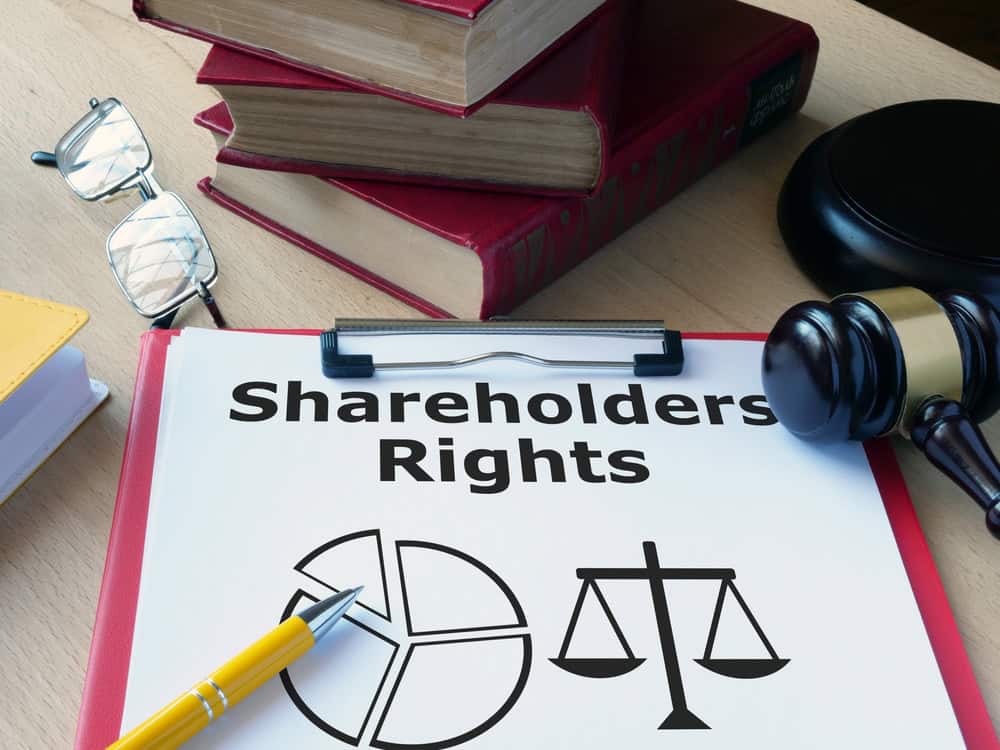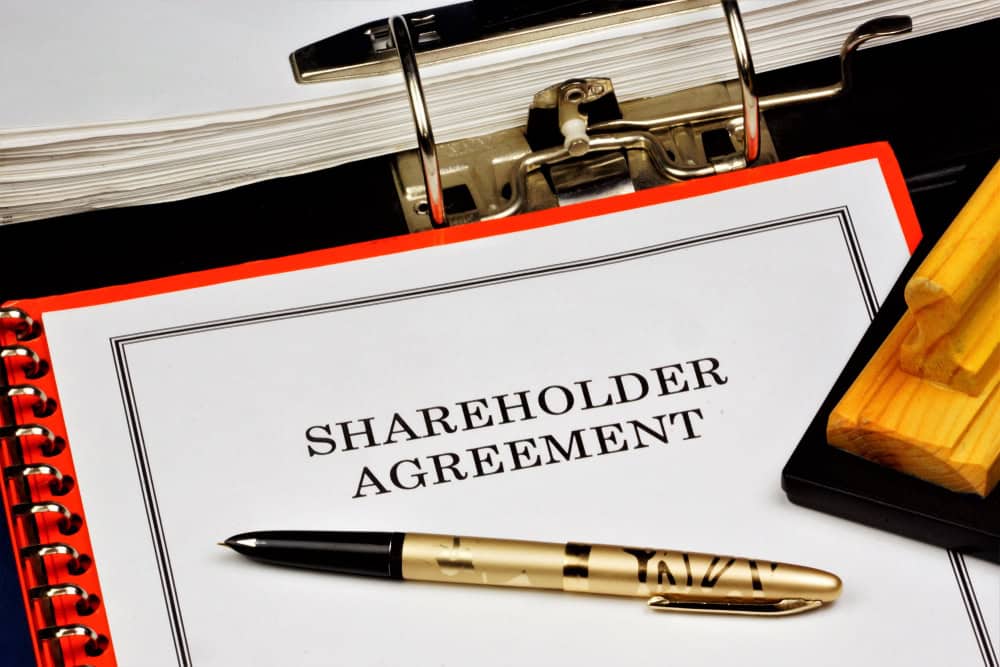Shareholders are the owners of a limited company. Also known as members and sometimes subscribers, these individuals (or corporate entities) invest money in a business in exchange for one or more shares, each representing a portion of ownership of the company.
In return for their investment, limited company shareholders are usually entitled to vote on certain matters in the business, including its overall direction, and receive a proportionate share of company profits.
Shareholders are also responsible for paying any unpaid amounts on the issue price of their shares (which is normally just the nominal value) if the company ‘calls up’ outstanding share capital or cannot pay its creditors.
Many small companies are owned by just one shareholder, who is often also the sole director. However, companies can have multiple owners and directors who may or may not be the same people. It’s a very flexible business structure.
Key Takeaways
- Limited company shareholders are individuals or legal entities that own one or more shares in a company limited by shares.
- They have various rights depending on the types of shares they hold. These may include the right to vote on important company matters and the right to receive dividend payments out of company profits.
- Shareholders do not make routine, day-to-day business decisions unless they are also directors of the company.
Shareholders, subscribers, members—what’s the difference?
We’ll get the semantics out of the way first. The terms ‘shareholder’, ‘subscriber’, and ‘member’ all refer to the individuals or corporate bodies who own shares in a limited company. However, these terms cannot be used interchangeably to describe all company owners. Let’s take a look at their meanings and the differences between each term.
What is a shareholder?
A shareholder is any individual person or legal entity (e.g. another company) that holds shares in a private or public company limited by shares. Shareholders are also known as members, but they are only referred to as subscribers if they join a company during its incorporation.
What is a subscriber?
The first shareholders in a company are called ‘subscribers’ because they subscribe (add) their names to the memorandum of association during the company registration process.
By doing so, each subscriber agrees to form and become part of the business by taking at least one issued share.
Shareholders who join a company after incorporation are not subscribers.
Who are the members of a company?
All limited company shareholders are members, regardless of whether they join the company during or after incorporation.
If they hold more than 25% of the issued share capital or have more than 25% of the voting rights in the company, they will automatically become a ‘person with significant control’ (PSC).
Do company subscribers have more rights?
Company subscribers do not necessarily have more rights than other members who join the company after incorporation.
The rights, powers, and obligations of members (including subscribers) are determined by their percentage of shareholdings or control in the company, the prescribed particulars of rights attached to their shares (in other words, the rights of the shares they hold), and the terms of any shareholders’ agreement that has been put in place.
Rights and responsibilities of limited company shareholders
Limited company shareholders are not involved in the day-to-day running of the business unless they are also appointed as directors. They will usually only make decisions on rare occasions, such as when directors have no authority to do so.
What rights do shareholders have?
Shareholders’ rights are defined in the prescribed particulars attached to their shares, which must be in accordance with the Companies Act 2006.

The prescribed particulars of each share class should be outlined in the articles of association and any shareholders’ agreement that exists.
Typically, a limited company shareholder will have the following rights and responsibilities:
- Taking one or more shares in a limited company
- Agreeing to contribute the unpaid issue price of their shares if the company is unable to pay its creditors
- Receiving company profits (dividends payments) or other distributions relative to the quantity and value of shares they hold
- Power to change the company name
- Power to change the company structure
- Authority to appoint and remove directors
- Granting rights and powers to company directors
- Issuing more shares after company registration
- Changing the rights attached to shares
- Approving substantial investments
Rights attached to ordinary shares
The majority of new companies issue ‘ordinary shares’. Each share carries equal rights, including the right to:
- Attend general meetings
- Cast one vote at general meetings
- Receive dividend payments (a share of business profits)
- Receive a distribution of remaining capital upon the winding up of the company
- Access statutory registers, in accordance with the Companies Act 2006
- Access the memorandum and articles of association
Shareholders’ rights become much more complex when companies issue multiple share classes. Carefully drafted articles or a shareholders’ agreement is crucial in such instances.
Rights of minority shareholders
Generally, minority shareholders (those owning less than 50% of a company’s issued share capital) have little control over the company’s management and direction.
The collective power of their votes can be cancelled out by the voting power of majority shareholders. An official shareholders’ agreement is the most effective way to protect minority investors from this type of unfair monopoly.
Financial liability of shareholders
Limited company shareholders invest money in shares. In return, they will usually be entitled to receive a portion of the company’s post-tax profits whenever dividends are declared.
Their financial responsibility to the company is limited to the total issue price of their shares (the issue price normally being its nominal value). This ‘limited liability‘ means that shareholders don’t normally owe anything above the nominal value of their shares, so their personal assets are protected.
Legally, shareholders need only contribute the unpaid amount of the issue price of their shares towards company debts. If the business fails or cannot afford to pay its bills, the company itself is almost always responsible for these liabilities—not the shareholders.
Who can be a shareholder?
Unless a company includes provisions in its articles of association restricting who can and cannot hold shares, any person or corporate entity can be a shareholder in a private limited company.
There is no statutory minimum age requirement for shareholders, so it’s not uncommon for children to own shares in family businesses. However, many companies will only issue shares to people aged 18 or over since minors cannot enter into contracts or make legally binding decisions.
Can a limited company shareholder also be a director?
Yes. Under the law, a shareholder can be appointed as a company director if they are at least 16 years old and not a disqualified director. Many companies are owned and managed by just one person, who is both the sole shareholder and sole director.
Can a company hold shares in another company?
A limited company shareholder can be an individual or a legal entity, such as another company or an LLP. Non-human shareholders are typically referred to as ‘corporate shareholders’.
A representative is appointed to act on behalf of the corporate body to attend general meetings, exercise voting rights, sign resolutions, and carry out any other shareholder duties. A director of the corporate body normally holds this position.
Benefits of a corporate shareholder
Established corporations that become members of another company can benefit smaller businesses because they often have greater resources, influence, and experience. We outline some examples below.
- They can provide capital to buy new equipment or to help the business grow.
- They often have established relationships with suppliers that can give small businesses greater bargaining power.
- Their involvement can positively influence other firms, investors and lenders to do business with a smaller company.
- They can offer valuable expertise in corporate governance and strategy, branding, market trends and research, legal matters, investment, sustainability, and economic growth.
Important points to note:
- If a corporate shareholder owns more than 50% of a company’s issued share capital, the corporate shareholder becomes the ‘parent’ (holding) company with majority control. The other company then becomes a subsidiary of the corporate shareholder.
- If you sell a large chunk of shares to a corporate shareholder, non-corporate shareholders with smaller shareholdings may be overpowered by the majority votes of the corporate shareholder.
Different types of shareholders
Most private companies issue only ordinary shares, which means they have only one ‘type’ of shareholder—those owning ordinary shares and enjoying the same rights as each other. In this situation, each person’s level of control and profit entitlement is based on their percentage of shareholdings in the company.
However, some companies issue different classes of shares, allowing them to vary their shareholders’ rights—typically voting, dividend, and capital distribution rights.
Popular share classes include:
- Preference shares, which provide preferential rights over other share classes to dividends and capital distributions
- Management shares, which carry extra votes per share but no dividend rights
- Non-voting shares, which provide dividend entitlement but no rights to vote on company decisions
If you’re considering issuing multiple classes of shares in your limited company, we advise seeking professional advice beforehand. You’ll also need to update your articles of association accordingly and, ideally, draw up a private shareholders’ agreement.
Are shareholders’ details displayed on the public record?
In accordance with company disclosure rules, the names of all shareholders and the number of shares they hold appear on the central public register at Companies House.
Each subscriber must provide their full name and service address (contact/correspondence address) for Companies House during incorporation, as well as the number of shares they are to hold. After incorporation, they do not need to update their correspondence address.
The only time a shareholder must provide additional information to Companies House is when they are also a person with significant control (PSC). Here, additional information will need to be provided about that person, such as their nationality, home address and date of birth.
Can I add new shareholders after company registration?
Yes. New shareholders can join a limited company after incorporation in one of two ways:
- transferring existing shares from current shareholders
- issuing and allotting shares to new members
‘Issuing and allotting’ shares means creating brand new shares and assigning them to the new shareholder(s). As long as the articles of association do not include a provision of authorised share capital, you can issue as many additional shares as you like.
Transferring shares, on the other hand, means transferring existing shares from one shareholder to another. Of course, it requires that one or more existing shareholders be willing to transfer their shares.
In most cases, directors have the authority to issue new shares and approve share transfers, but it is possible for members to restrict directors’ powers in the articles.
If the articles of association contain any provision preventing a director from authorising a transfer or allotment, they must follow the relevant procedure set out in the articles. A clause in the articles or a shareholders’ agreement may also provide ‘pre-emption rights’ to existing members.
Pre-emption is a ‘first-refusal’ clause that allows current members to take additional shares before the company offers them to outside investors. This protects their rights and prevents their proportion of ownership from unfair dilution.
Notifying Companies House about new shareholders
If you choose to transfer shares, you won’t have to provide Companies House with information about the new shareholders until your next confirmation statement is due. However, it is considered good practice to update this information as soon as possible.
If you allot more shares, you must complete form SH01 Return of Allotment and file it at Companies House within one month of the allotment. Again, there’s no legal requirement to provide new shareholders’ details until the next confirmation statement is due.
The directors must update the company’s statutory register of members as soon as possible with details of the new members. Furthermore, if any member holds more than 25% of the company’s issued share capital or has more than 25% control of the business, the directors will need to record the person’s details in the register of people with significant control (PSC register).
Within two months of becoming a member, new limited company shareholders should receive a share certificate as proof of ownership. The company should keep copies of all certificates and any stock transfer forms at the company’s registered office or Single Alternative Inspection Location (SAIL) address.
Do I need a shareholders’ agreement?
A shareholders’ agreement is a legally binding, private contract between a company’s members. It expands on the Companies Act 2006 and the articles of association, defining the specific rights and responsibilities of members and directors, how the business should be managed, and how certain decisions are made.
While a shareholders’ agreement is not a legal requirement, it is highly recommended for any limited company with more than one shareholder.
What is the purpose of a shareholders’ agreement?
This type of agreement is an effective way to ensure all members are equally protected and aware of their rights, restrictions, and obligations in all circumstances. The exact contents of an agreement can vary considerably from company to company, but the principal purpose of the document is to provide clarity and prevent conflict between shareholders.

Furthermore, a formal agreement protects the interests of minority shareholders against the potentially detrimental voting powers of majority shareholders.
The key issues often covered by a shareholders’ agreement are as follows:
- Distribution of company profits (dividends, directors loans, reinvestment in the company)
- Appointment and removal of directors and company secretaries
- Rights and restrictions of company directors
- Directors’ salaries and other forms of remuneration
- Prescribed particulars of rights attached to shares
- Procedures and restrictions for transferring and issuing shares, such as authorised share capital, pre-emption rights, and directors’ powers
- Company finance and investment
- Protecting minority shareholders’ rights, e.g. stipulating that company decisions require the unanimous agreement of all shareholders, not just a majority vote
- Changing the nature or structure of the business
- Dispute resolution guidance
- Guidelines for legal proceedings
- Information rights of shareholders
There are no rules dictating where this document must be kept. However, most firms retain copies of any shareholders’ agreement with other statutory records at their registered office or SAIL address.
Are shareholders’ agreements displayed on the public record?
Unlike the majority of company documents and records, a shareholders’ agreement is a private and confidential document. There is no need to file it at Companies House, disclose it on public record, or make it available to anyone who asks to inspect the company’s statutory registers.
Who can create a shareholders’ agreement?
The members (ideally with the help of a solicitor) can draw up a shareholders’ agreement before or after company registration. It can be altered at any time upon the agreement of all members (or as otherwise stipulated by the agreement).
If the company introduces changes that affect any provisions in the agreement, the members must update the document immediately. Similarly, amendments may be necessary upon changes to any laws or regulations affecting the company.
Who owns a limited company?
Shareholders are the owners of a company limited by shares. Their level of ownership depends on their percentage of shareholdings and the rights attached to their shares.
It’s slightly different in a company limited by guarantee. The guarantors do not actually own the company because there are no shares (portions of the company) to own. Rather, they control the company.
Thanks for reading
We hope you’ve found this post helpful. Please comment below if you have any questions, or get in touch with our London-based team if you need help registering a limited company.
You can also explore the Rapid Formations Blog or our Frequently Asked Questions support page for more limited company guidance and general business advice.
Please note that the information provided in this article is for general informational purposes only and does not constitute legal, tax, or professional advice. While our aim is that the content is accurate and up to date, it should not be relied upon as a substitute for tailored advice from qualified professionals. We strongly recommend that you seek independent legal and tax advice specific to your circumstances before acting on any information contained in this article. We accept no responsibility or liability for any loss or damage that may result from your reliance on the information provided in this article. Use of the information contained in this article is entirely at your own risk.














Join The Discussion
Comments (22)
I was sold 62500 shares in a Limited company back in July of 2019. I still hold the share certificate -but have had no dividends and no information from the company. The company is still operating and advertising and is registered with Companies House. I have asked repeatedly for information on my investment – with no response. What do I do next to either get my money back or a return on my investment?
Thank you for your kind comment, Simon.
Unfortunately as we are not regulated to provide legal advice, we are unable to provide advice on specific scenarios. We would recommend contacting a solicitor for further assistance.
Please accept our apologies for any inconvenience caused.
Kind regards,
The Rapid Formations Team
Looking for some advice please? I am a shareholder in a private limited company. There are 4 of us all with equal 25% of shares. I want to sell my shares. The other share holders have been given the option to purchase my shares. However, they do not want to at the moment. Can I now sell my shares to someone outside the company?
Thank you for your enquiry, Joanne.
In general terms, it is possible for you to transfer your shares to an external party, providing that if the company has any pre-emption rights or special provisions, these are waived.
I trust this information is of use to you.
Kind regards,
Rachel
Hi, we have a company with 4 shareholders who are all company directors, 3 have a 26% shareholding each. One of the Shareholders wants to sell his shares but another with a 26% stake has refused meaning the shareholder that wants to sell is stuck. The same shareholder who is blocking the sale is also blocking investment in new kit to facilitate growth. We are in a situation where one shareholder is restricting the others ability to grow the business, develop future earnings and the ability for any other shareholder to sell shares. Is there a legal remedy for this? The shareholder agreement states there is a requirement for 75% of voting rights to make a constitutional change. Thanks
Hi Steve,
Unfortunately, we cannot advise on your position, however, we would suggest that you take legal advice on this matter.
Best regards,
Rapid Formations Team
If 3 of us are directors and equal shareholders (2 of which are sisters), can one of the other shareholders (sister 1) sell to the other shareholder (sister 2) and gain greater control over the company and make decisions without me?
Dear sir,
Thank you for your message.
The 2 shareholders can sell shares as prescribed in the company’s Articles of Association which will likely mean that one sister can sell shares to another. The decisions regarding the company on a day to day basis are made by the directors so decisions would continue to be made as before as there have been no changes to directorships. Shareholders will, however, have the right as prescribed in the Articles of Association to remove directors so if they intended to remove your ability to make decisions then that is how they would move forward.
Best regards,
Rapid Formations Team.
I’m a 50% shareholder and my other shareholder has does leaving his shares to his parter. She is selling these and I can’t afford to buy them. She is going to sell them out of spite to someone I don’t get on with (previous working issues). Is there anything I can do to stop the sale to this particular person.
Hi Marie,
I would advise taking some advice on this. We are not lawyers so cannot advise on specific matters like this.
Best regards,
Rapid Formations Team
Can a company buy its own shares?
Dear John,
There are methods by which a company can buy back its own shares however we cannot advise on what methods would be suitable in individual cases. If you have a specific requirement I would suggest that you seek advice from an
accountant or solicitor.
Best regards,
Rapid Formations Team
Can a managing director of ltd company hold shares of another company (plc)?
Dear Sir
There are no specific restrictions in ownership of companies unless there is something specific in the rules of the company in which you are the managing director.
Best regards,
Rapid Formations Team
I am the director/shareholder/member of a new company set up via Rapid formations. It is to enable my daughter to start a home care business. I will put in the initial working capital of £20000. I can get tax relief if I own less than 30% of the issued shares. How can we get to a position where I own 25% and she 75%? She has no money to buy shares.
Dear Anthony,
We are not accountants so could not advise on any financial implications or requirements for a company. You may however be able to give monies to the company by way means other than shares such as by a loan but we would suggest you consult an accountant before making any decisions.
Best regards,
Rapid Formations Team
Recently we formed joint venture private limited company – Feldnew India Private Limited with Indian Resident with 33% share and Chinese guys with 67% share. After company formation, chinese guys came to know that they cannot make subscription money as an individual from their country. China will allow them to invest as a company from their end than individual. At present, in AOA and MOA, chinese guys subscribed shares for 67%. Since they are unable to send their subscription money into company as an individual, what is the solution for us? Can we take other Indian in their place? if so, what is the process? Pls advise
Dear Prasad
This is a legal matter and We would advise you seek the assistance of a solicitor about this matter.
Best regards,
Rapid Formations Team
I don’t want to become a shareholder anymore in a limited company and no one want to buy my share what should I do
Plz help
Dear Denis,
I would advise that you discuss this matter with a solicitor as there may be provision for such a situation in the company’s official documents but it may be the case that you have to keep your shares until a buyer is found.
Kind Regards
I am currently in a equale 3 director limited building company we have just finalised high profit contracts for the next ten years. So our small company has expanded beyond our expectations and now two more employees want us all to go 5 equal ways on share if we did this 3 of the 5 directors would have equale shares in there own bigger company and 3 equal shares in my company meaning the 3 off them could vote together against me and my partner we started this company it is us that complete the work carried out and take care of all aspects of the works carried out. So I’m I right in saying our skill and workmanship and the way we deal with the projects from start to finish that is the heart and sole of the company and without the 3 other shareholder from the other company wouldn’t have a company to promote. I’ll give you a summary of these 3 future shareholds 1 has 60% of a successful company easily multi million a year then another shareholder that promotes and expands business and does all the networking to bring us in big job to tender for. The other boy does the same but also keeps the money right with taxes and budgets all the finances but also he finds contract and new clients and try’s to bring in work and the both develope a relationship with existing client to ensure all there needs are taken car of and that the client is always fully aware of the program of work and that they are comfterble and stress free during the construction work. The question is to protect me and my parter for become the minority share holders of our own company that has an estimated £500,000 profit in first year from the work we already have. They see the potential and the numbers and want a price of my company how can I ensure my dafty at the company I started and iv built is there a contract of some sort that can protect my bests interests in my shares of the company could they three go against us and take my company and still have theres bigger company so I could end up with nothing
Thank blank
Dear Ashleigh,
Thank you for your message. We are not advisors on technical accountancy matters and I would suggest that you seek professional advice from an accountant before proceeding.
Best regards,
Rapid Formations Team